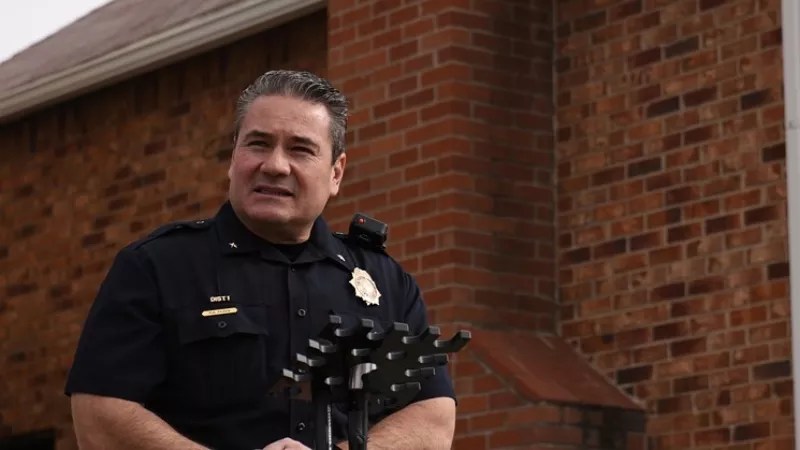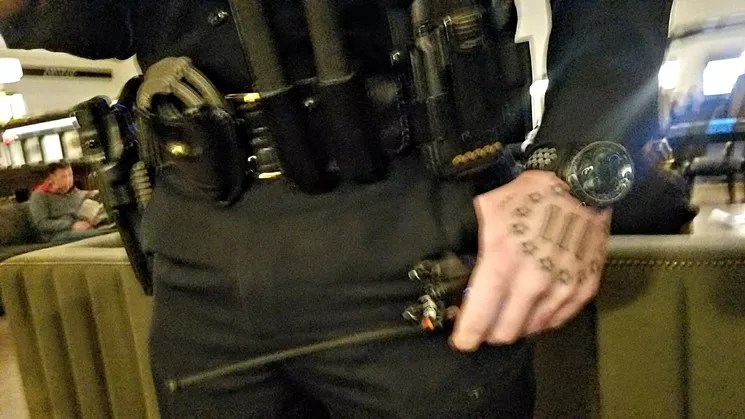
Kenzie Bruce

Audio By Carbonatix
The January 6 riot at the U.S. Capitol has raised new questions about insurrectionist sympathies in the ranks of law enforcement agencies. There are reports of bias and racism among the Capitol Police; some members are accused of giving invaders kid-glove treatment and even aiding and abetting the destruction; two officers have been suspended and at least ten more are under investigation for their alleged roles in the ugliness that went down last week.
We wanted to talk to Denver Police Chief Paul Pazen about these issues in advance of reports about potential armed demonstrations this weekend at state capitols, including Denver, as well as to learn in detail if the DPD is concerned that some of its officers may have similar leanings. We also hoped to find out if the recent events in Washington, D.C., might impact recruitment of new cops.
But Pazen rejected Westword‘s interview request, instead delivering a brief statement while emphasizing the rights of officers to express their political views.
“The Denver Police Department is made up of women and men who put on the uniform and badge every day to make a positive difference in the lives and safety of our neighbors,” Pazen said. “We recruit and hire with a focus on diversity, and that hiring process includes extensive background checks and psychological assessments. While recognizing the importance of free speech protections, the Department also has a code of conduct and policies against bias, and should an officer act outside of those policies, they are subject to discipline.”

A photo of Officer Michael Traudt shows a tattoo on his hand whose design duplicates the logo of an anti-government militia group, but he says he was never a member of the organization.
Special to Westword
Discipline wasn’t delivered in connection with a controversy that arose in December 2018, several months after Pazen took over as police chief, however. Westword obtained a photograph of Officer Michael Traudt, previously in the news over his 2015 killing of Paul Castaway, a suicidal man who was wielding a knife when he was fatally shot, showing a tattoo on Traudt’s hand depicting a logo used by the 3 Percenters, depicted by the Anti-Defamation League as an anti-government militia group. Traudt insisted that he wasn’t a member of the 3 Percenters and had gotten the tat because he saw it as patriotic, and the department meted out no discipline against him, asking only that he cover the image while on duty. Traudt is still on the force, according to his LinkedIn profile.
The department’s operation manual devotes twelve pages to the DPD’s code of conduct, and offers this definition of biased policing: “the practice of singling out or treating differently any person based solely on any of the following: actual or perceived race, color, creed, national origin, ancestry, sexual orientation, physical or mental disability, age, gender/sex (including pregnancy, childbirth, or caregiver status), marital or military status, religion, political affiliation, or any other basis protected by federal, state, or local law or regulation.”
More specifics about officer expectations are in a section dealing with social media use – including a passage that could be tied to a 2015 brouhaha over a cop who Facebooked a photo of then-police chief Robert White sans his duty belt in an apparent attempt to embarrass him. “Department personnel are free to express themselves as private citizens on social media sites to the degree that their speech and express does not impair working relationships of this department for which loyalty and confidentiality are important, impede the performance of duties, impair harmony among coworkers, adversely impact the disciplinary process, or cause disruption to the department, or to any other city agency,” it states.
But another excerpt warns against “speech and expression containing obscene or sexually explicit language, images or acts and statements, or other forms of speech that ridicule, malign, disparage or otherwise express bias against any race, any religion or any protected class of individuals.”
Denver could hear plenty of that from protesters over the next few days. But from police?
On January 13, Pazen and Director of Public Safety Murphy Robinson appeared before Denver City Council’s safety committee to discuss the Office of Independent Monitor report critical of the DPD’s handling of demonstrations this summer.
“It’s very difficult in some circumstances, when you have a large group, to identify the handful of individuals that are causing harm, that are violating laws, and to be able to address those without negatively impacting folks that are just there to have their First Amendment rights be heard,” Pazen told councilmembers.
Click to read the Denver Police Department operations manual.